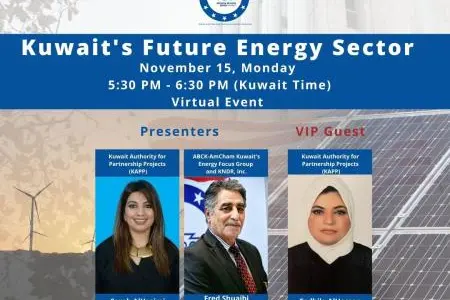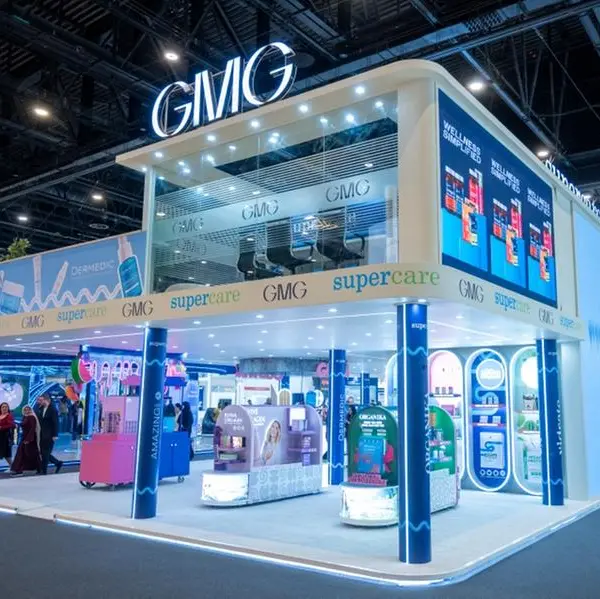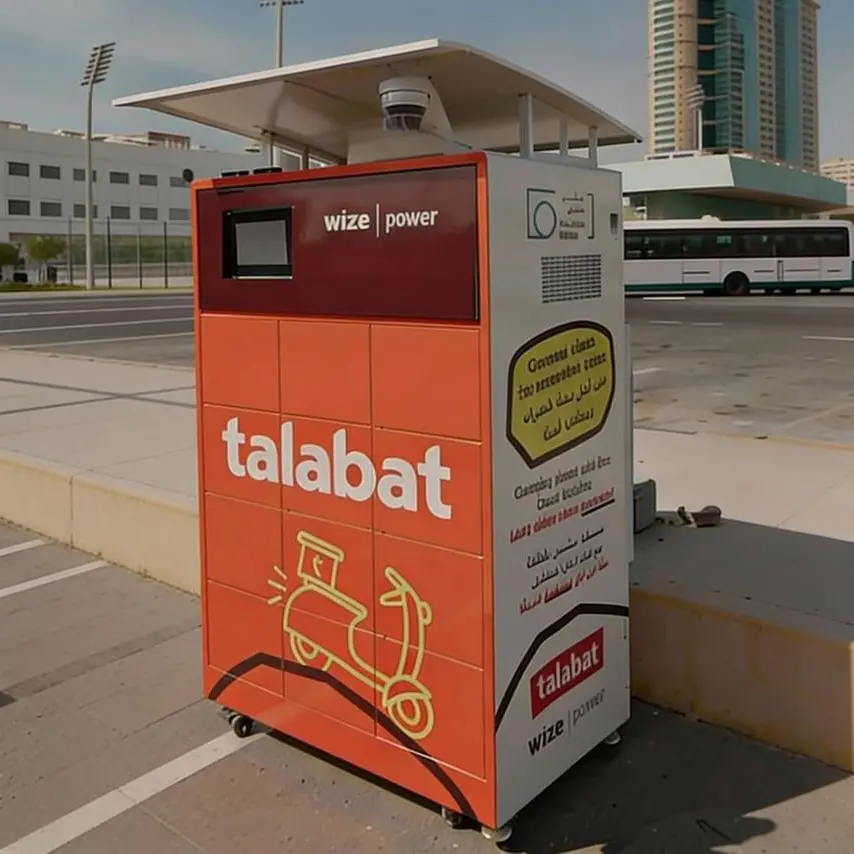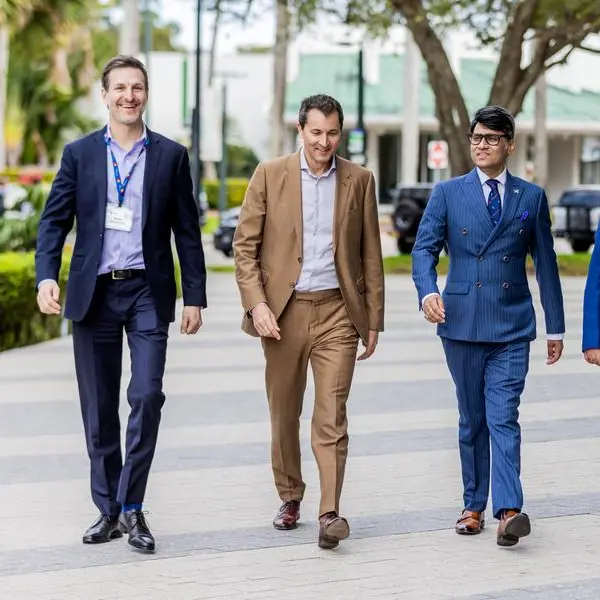PHOTO
Kuwait – ABCK – AmCham Kuwait hosted a webinar on the topic of ‘Kuwait’s Future Energy Sector’ presented by: Sarah AlUsaimi, Industrial Engineering Specialist at Kuwait Authority for Partnership Projects at the Kuwait Authority for Partnership Projects (KAPP), and Fred Shuaibi - Energy Focus Group Chair (ABCK-AmCham Kuwait) and Partner in Charge at KNDR.
AlUsaimi spoke on the topic of ‘PPP & Renewable Energy Projects in Kuwait’, starting with Kuwait’s demographics, as well the structure of Foreign Investment in Kuwait, as she briefly explained the roles of three important bodies in Kuwait’s business environment including KDIPA (Kuwait Direct Investment Promotional Authority), Council of Ministers General Secretariat, and KAPP. AlUsaimi further elaborated on the role of KAPP as the main body responsible for PPP projects implementation.
AlUsaimi explained ‘Kuwait Vision 2035’ and the Kuwait National Development Plan in which a unified direction is intended to transform Kuwait into a financial, cultural, and institutional leader in the region. She explained that the program is organized around seven pillars and 5 strategic directions, which are Kuwait’s global position, human capital, healthcare, living environment, infrastructure, economy, and public administration.
The PPP framework in Kuwait was explained and its various components, such as the Department of Legal Advice and Legislation, State Audit Bureau, other public entities. AlUsaimi also spoke about the PPP Project cycle in Kuwait which starts with the preparation of the project proposal and then goes to the assignment of the Transaction Advisor, which then leads to the preparation of a feasibility study. The project and EOI are then announced and preparation and release of RFQ Documents are done, as it then moves to the evaluation of submitted SOQs and preparation and release of RFP Documents. Next, the selection of the preferred bidder and negotiations are done and finally, the signing of the PPP agreement and financial closure is done.
AlUsaimi explained the milestones for the Kuwaiti PPP program and highlighted that since its establishment in 2014, KAPP had tendered around (7) projects in multiple sectors (utilities, education, waste management, real estate, and services), worth 4,840 million USD in estimated Capital Expenditure (CapEx). Another important milestone was KAPP’s latest project, Um Al Hayman WWTP, which achieved financial close on July 29th, 2020, during the COVID-19 pandemic and received many regional awards and global recognition.
AlUsaimi also explained some advantages of doing PPPs in Kuwait including high credit rating, political stability, internationally recognized democracy, attractive incentives such as waivers on customs and taxes, and low usufruct fees. Other benefits include a legally binding and well-defined contractual framework, transparent competitive bidding procedures with external oversight and audit, governmental high need of infrastructure development/enhancement of services to meet demand, and urban development amongst others.
AlUsaimi then gave in-depth information on Energy Sector in Kuwait and briefly explained the various Renewable Energy Projects in Kuwait such as the Shagaya Renewable Energy Project whose first phase was completed under the supervision of the Kuwait Institute for Scientific Research (KISR), which contracted by leading international companies in the field of solar and wind power plants. Al-Dibdibah Power & Shagaya Renewable Energy – Phase III Project is an extension to Kuwait’s vision of producing up to 15% of the energy from renewable energy sources by the year 2030. She highlighted that Al-Dibdibah Power & Shagaya Renewable Energy – Phase III Project is intended to utilize a mix of different technologies, that might include Solar Photovoltaic (PV) plant, Concentrated Solar Power (CSP) plant, Wind Power Plant.
Fred Shuaibi then followed the presentation with the topic of ‘Kuwait's Oil & Gas Sector’s Efforts in the Road to Recovery Post-Pandemic’. He started his presentation by speaking about the challenges and setbacks that Kuwait’s Oil & Gas sector (OGS) has experienced due to the pandemic, as well as the global energy and its impact on the world’s economy. Shuaibi said that Kuwait has recognized the urgent need to regroup its OGS sectors that suffered heavily in terms of day-to-day operations, loss of expert and skilled manpower in its various OGS due to Pandemic lockdowns, and limited access to workplaces.
He explained that the OGS authorities have worked on revamping the affected operations in the OGS and initiated various recovery plans starting with consolidating its companies' structure and regrouping all OGS companies under 3 major companies. Shuaibi further explained that the move aimed at reducing setbacks caused by the pandemic and to provide a strong recovery plan during the upcoming period through strong and well-coordinated management in its quest to save costs and reap reasonable profit. This will help boost the local economy and the country’s visionary National Development Plan (NDP) vision of 2035.
Shuaibi said that Kuwait’s OGS is the backbone of the economy and the country’s major revenue; being the development mechanism for the various sub-development plans of Kuwait’s NDP vision of 2035.
The Kuwaiti OGS has entered the current post-pandemic critical period with its recovery plan by continuing full operations of previously contracted projects and issuing new projects in support of the local OGS production operations and maintenance activities for its overall facilities. This ambitious plan has added more oil well drilling and exploration by tapping various oil resources to gain time and money to meet the local economy recovery expectation, and the international market demands.
Shuaibi explained the Kuwait Petroleum Corporation’s (KPC) Strategy Guidelines which are: 1. Sustaining Crude Oil Production, 2. Development of free(non-associated) gas fields, 3. Development of new “hydrocarbon” conventional resources, 4. Construction of a new greenfield refinery in Kuwait, 5. Upgrading existing refineries to produce cleaner products, 6. Construction of liquid natural gas (LNG) import facilities, 7. Construction of an integrated refining and petrochemical complex in Vietnam, 8. Applying renewable resources technology in the OGS to reduce energy consumption.
Finally, Shuaibi summarized that Kuwait’s OGS has several major factors to address in its road to full recovery as mentioned while hoping that these plans and efforts subsequently will grant Kuwait a better future in its quest to develop a new Kuwait as a new flourishing, investment sound, making it a profitable/economical international zone and by all a bright future for a New Kuwait Vision of 2035.
The presentation came to an end with this and was open for Q&A from the audience.
-Ends-
© Press Release 2021
Disclaimer: The contents of this press release was provided from an external third party provider. This website is not responsible for, and does not control, such external content. This content is provided on an “as is” and “as available” basis and has not been edited in any way. Neither this website nor our affiliates guarantee the accuracy of or endorse the views or opinions expressed in this press release.
The press release is provided for informational purposes only. The content does not provide tax, legal or investment advice or opinion regarding the suitability, value or profitability of any particular security, portfolio or investment strategy. Neither this website nor our affiliates shall be liable for any errors or inaccuracies in the content, or for any actions taken by you in reliance thereon. You expressly agree that your use of the information within this article is at your sole risk.
To the fullest extent permitted by applicable law, this website, its parent company, its subsidiaries, its affiliates and the respective shareholders, directors, officers, employees, agents, advertisers, content providers and licensors will not be liable (jointly or severally) to you for any direct, indirect, consequential, special, incidental, punitive or exemplary damages, including without limitation, lost profits, lost savings and lost revenues, whether in negligence, tort, contract or any other theory of liability, even if the parties have been advised of the possibility or could have foreseen any such damages.




















